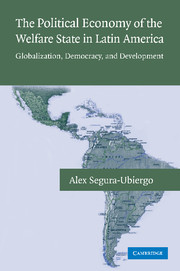 The Political Economy of the Welfare State in Latin America
The Political Economy of the Welfare State in Latin America Book contents
- Frontmatter
- Contents
- Tables and Figures
- Acknowledgments
- 1 Introduction
- 2 The Historical Evolution of Welfare Systems in Latin America: Qualitative Comparative Analysis
- 3 Theoretical Framework and Main Hypotheses
- 4 Determinants of Social Spending in Latin America: A Time-Series Cross-Section Analysis, 1973–2003
- 5 Chile: A Classic Latin American Welfare State under Authoritarian Stress (1973–1989) and Democratic Reinvention (1990–2000)
- 6 Costa Rica: Globalization, Gradual Reform, and the Politics of Compensation, 1973–2002
- 7 Peru: Political Instability, Regime Change, and Late Economic Reform in a Non-Welfare State, 1973–2000
- 8 Conclusion: Summary and Final Reflections on the Sustainability and Effectiveness of Latin American Welfare Systems
- Bibliography
- Index
1 - Introduction
Published online by Cambridge University Press: 10 July 2009
- Frontmatter
- Contents
- Tables and Figures
- Acknowledgments
- 1 Introduction
- 2 The Historical Evolution of Welfare Systems in Latin America: Qualitative Comparative Analysis
- 3 Theoretical Framework and Main Hypotheses
- 4 Determinants of Social Spending in Latin America: A Time-Series Cross-Section Analysis, 1973–2003
- 5 Chile: A Classic Latin American Welfare State under Authoritarian Stress (1973–1989) and Democratic Reinvention (1990–2000)
- 6 Costa Rica: Globalization, Gradual Reform, and the Politics of Compensation, 1973–2002
- 7 Peru: Political Instability, Regime Change, and Late Economic Reform in a Non-Welfare State, 1973–2000
- 8 Conclusion: Summary and Final Reflections on the Sustainability and Effectiveness of Latin American Welfare Systems
- Bibliography
- Index
Summary
The welfare state is the culmination of a centuries-old struggle for social protection and security in the industrialized countries. It may justly be regarded as one of their proudest achievements in the post-war period. It set a model and a standard for aspiration for the newly industrializing and transitional countries as also for the poorer countries.
Let us narrowly define the welfare state as a repertoire of state-led policies aimed at securing a minimum of welfare to its citizens – that is, protecting them against the risks of unemployment, sickness, maternity, and old age – and providing an adequate accumulation of human capital through public investments in health and education. As such, the importance of the welfare state can hardly be overstated. Welfare states are a fundamental part of advanced modern capitalism in the West. They affect income inequality and poverty rates, they shape labor markets, they change public perceptions of how citizens perceive what the role of the state in the economy should be, and they influence the long-term prospects for economic growth through their investments in human capital and their legitimizing role for the political system. It is therefore not surprising that in recent years there has been a proliferation of studies related to the origins, development, and crises of the welfare state.
Researchers have focused on the economic and demographic transformations related to the expansion of welfare effort; on the effects of state structure; on the importance of policy legacies; on how the distribution of power among political parties and interest associations generates different “types” of welfare states; on the connection among economic openness, domestic vulnerability, and the establishment of social safety nets; on the relationships among deindustrialization, technological change, and welfare state expansion; and on the impact of aging on the sustainability of the welfare state.
- Type
- Chapter
- Information
- The Political Economy of the Welfare State in Latin AmericaGlobalization, Democracy, and Development, pp. 1 - 23Publisher: Cambridge University PressPrint publication year: 2007


